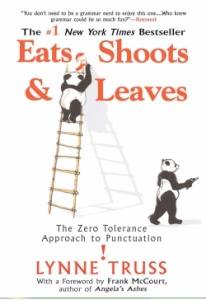
“Sticklers Unite!” -backcover matter, Eats, Shoots & Leaves
My recent experience as non-fiction editor for The British Columbia Review had me pick this book off my shelf, and read it from cover to cover.
Within this title, author Lynne Truss wrote, with humour and passion, about the importance of meaning within punctuation. But even back in the early years of the twenty-first century, she was apprehensive of the influences of new electronic media that were creeping in to knock away conventions formed over centuries. I could certainly write a great deal on this, and how it changes meaning in language, but I’m choosing to focus on a topic she delves into near the end of the book: how the medium is the message, to coin Marshall McLuhan.
Electronic media are intrinsically ephemeral, are open to perpetual revision, and work quite strenuously against any kind of historical perspective. (p. 181)
Whoa. Now, this took me aback. Could the way that people think on the subject of history, (ie. the recent tendency toward revisionist history) be directly attributable to the kind of easily-revisable desktop technology we’re using to write nowadays, such as WordPress? In this sense, is truth being chipped away at? Revised: because that’s what our current media lets us do? As a former Communication major at SFU, this made me sit up and listen. Put another way: Is it possible ‘revisionist history’ is simply a response to desktop publishing?
Is the medium truly the message, even in this day and age?
Lynne Truss is also at pains to mention “by tragic historical coincidence a period of abysmal under-educating in literacy has coincided with the unexpected explosion of global self-publishing.” (p. 182) Having self-published two books, I’ll try not to take this statement personally. But one recent self-published book, intended for parents of young, keen hockey goalies, that has crossed the threshold into our household, certainly has me wishing the author had hired a good copy editor.
One cannot look at the erosion of punctuation use without acknowledging the contribution of the text message. The emoji, or emoticon as Truss calls it, has also been responsible. The use of ellipsis, exclamation, and other excesses in correspondence (I’m guilty as charged!) are not spared the whip of Truss’ criticism, and far from a stickler, she presents a very convincing argument. This is not done through heavy-handedness, nor by guilt-mongering, but by good humour, an approach I think is well-warranted to make a comeback.
Author: Lynne Truss
Book: Eats, Shoots & Leaves: The Zero Tolerance Approach to Punctuation
Publisher: Gotham Books (Penguin)
Year of Publication: 2003
